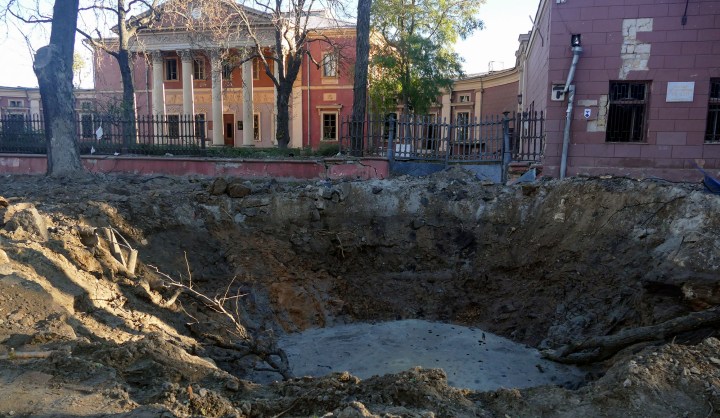UKRAINE UPDATE: 7 NOVEMBER 2023
Russia strikes infrastructure near Odesa; Germany ready to assume Nato leadership role

Russia launched Shahed drones at infrastructure near the southern Ukrainian port of Odesa overnight, damaging storage facilities, loading equipment and grain trucks, regional governor Oleh Kiper said on Telegram. Eight people were injured. Residential buildings and a museum also suffered damage, he said.
Germany was ready to take on the leadership role in Nato that allies have been urging for decades and Europe’s biggest economy and most populous nation was committed to protecting the military alliance’s eastern flank against Russian aggression, Defence Minister Boris Pistorius said.
“Nato has gained even more relevance and importance with Russia’s brutal attack on Ukraine,” Pistorius said on Monday at a conference on Nato policy in Berlin. “Because we can’t expect Russia to abandon its imperial fantasies in the coming years and decades, we are contributing significantly in the alliance to a credible and effective deterrence.”
Ukrainian President Volodymyr Zelensky submitted a draft law to parliament extending martial law and mobilisation by 90 days, legislator Yaroslav Zheleznyak said on Telegram.
Latest developments
- Saudi, Russia stick to planned oil cuts amid Middle East tension
- Zelensky urges Congress to pass Ukraine aid or risk bigger war
- Ukraine missiles damage vessel at Crimean shipyard, says Russia
Oil advances after Saudi Arabia and Russia reaffirm supply cuts
Oil gained after Saudi Arabia and Russia reaffirmed they would stick with oil supply curbs of more than one million barrels a day until the end of the year.
Global benchmark Brent crude rose to nearly $86 a barrel. The announcement by the Opec+ heavyweights on Sunday comes after a fading Israel-Hamas war premium and concerns over weaker global demand pushed oil prices down by more than 6% last week.
Crude surged at the start of the war between Israel and Hamas, but those gains have now been almost entirely unwound as the fighting has not disrupted supplies from the Middle East, the source of about a third of the world’s oil.
While it’s still possible the conflict could spread across the region, the impact on prices has given way to fresh concerns about a slowing global economy. A surprise contraction in Chinese manufacturing last month has raised questions about the recovery in the world’s biggest oil importer, while US stockpiles are growing.
“We believe these voluntary supply cuts are likely to be extended into the first quarter of 2024 — given seasonally weaker oil demand at the start of every year, ongoing economic growth concerns, and the aim of producers and Opec+ to support the oil market’s stability and balance,” said Giovanni Staunovo, a commodity analyst at UBS Group AG.
Saudi Aramco, meanwhile, kept its December official selling prices unchanged to Asian customers for two of five oil grades. However, the kingdom slashed its prices for Europe, a further sign of the concern over consumption in the region.
Slovakia won’t block private arms exports to Ukraine, says Fico
Slovak Prime Minister Robert Fico softened a key election promise to halt military aid to Ukraine, saying his government would not block supplies of weapons and ammunition from private manufacturers.
Fico, who pledged before the September vote that “not a single round” would come from Slovakia to its eastern neighbour, said on Monday that the campaign pledge related only to supplies from the Slovak army stockpile.
Read more: Pro-Russia Fico returns to Slovak premiership in challenge to EU
“If a company wants to produce and sell weapons abroad, we have nothing against it,” he told reporters after visiting the Defence Ministry headquarters in the capital, Bratislava.
With an annual output of around 180,000 artillery shells, the Nato member state of 5.4 million people became a key ammunition supplier to Ukraine, which also obtained Slovak-made howitzers. DM

















Comments - Please login in order to comment.